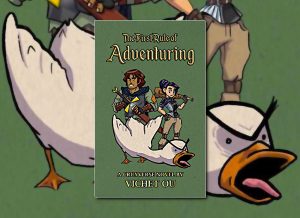THE FIRST RULE OF ADVENTURING by Vichet Ou (Book Review)
The First Rule of Adventuring is a musically-infused comic fantasy novel about an adventurer who screws himself into taking on a plucky princess as his apprentice. During a routine rescue mission, Asmund Alefson’s plans to return Princess Silga home go awry when she asks him an innocent question.
“Asmund, do you think I’d make a good adventurer?”
Of course not, he thought. What was she trying to hear? And how would he avoid kicking her while she was down?
In these difficult moments of great social strain and tactful reality-checking, it was helpful to remember the first rule of adventuring: lying is often convenient in the short term.
“Well,” he said slowly. “I figure if you can handle being kidnapped five times a year and manage to keep all your fingers and toes, you must be doing something right. Yeah, you could make it as an adventurer.”
Shortly thereafter, Silga calls his bluff and Asmund reminds himself of the other first rule of adventuring (well, one of the others): Lying is only convenient in the short term. When it becomes apparent that Silga is sick of being a princess, doesn’t want to go home to her mother, and is hell-bent on becoming an adventurer like Asmund, they strike a deal: Asmund will escort her home the long way and train her as an adventurer until the expiration date on his contract. After that, Silga will make her appearance at home, Asmund will collect his payout, and the two will go their separate ways.
What follows is a buddy comedy full of monsters, conspiracies, and musical references. Music is central to the worldbuilding here. As far as I can tell, this story is the novelization of an unwritten rock opera. Much like the Silmarillion, the gods sang the world into being, but the band broke up. Their divine melody was once the source of magic and faded away, but it’s starting to be heard again. The strongest magic users in this world are bards, leading to an interesting magic system and a few pop culture references. And silly cultural traditions.
Asmund quickly signed the document, danced the customary jig of agreement, and Zelisa provided him a copy along with the ten kazoo advance.
What took me by surprise, though, was how this book tackled class inequality. Asmund is a freelance adventurer; he didn’t make it in the Heroes’ Guild because it was an old boys’ club mostly concerned with fancy hero clothes and he couldn’t afford to keep up. He represents the working class, the people who are working to stay fed and view their job as just a means of survival. He’s rescuing princesses strictly for the money, and has a whole system for conning his way into polite society so they’ll look at him long enough to award him the contract.
With a list of fake references, he’d sneak into garden parties, drink too much tea, attempt to find the outhouse in a thirty room palace, relieve himself in a forgotten closet, stumble into the house retainer, explain how in Castáña all the outhouses were in-house, somehow manage to bring up the less-than-polite subject of the house masters’ recently kidnapped daughter or sometimes son, tell the retainer he ‘knows a fine adventurer of right and noble company’ who can offer rescue services, and then showing up for the introduction as Asmund, excusing Armando’s absence because of dancingpox, or regular pox, or an upset stomach that may or may not be onset of pox.
Silga, meanwhile, seems to be adventuring on a lark. She comes from wealth and privilege, and things just seem to go her way. The worst part (to Asmund, at least), is that she’s a natural adventurer without even trying. She doesn’t even need the money. The money is a pittance to her. She’s out because she’s bored with her life and wants a grand adventure.
“About that – why didn’t you take the Burlybear Bridge?” Silga asked. “Was it closed?”
He gritted his teeth. “I couldn’t afford the toll.”
“How much was it?” Drima asked. “Like, twenty kazoos?”
Asmund stared at her, flabbergasted. Twenty gold kazoos was less a bridge toll and more like a month’s rent, groceries, and more beer than he’d ever bought at one time. “It’s five copper whistles,” he said after a beat.
Silga stopped in her tracks. “Wait, hold on; You’re telling me you went a hundred miles out of your way because you couldn’t spare five whistles?” Silga asked.
“Fifty miles,” Asmund corrected her.
“Whatever, that’s forty too many,” Silga said.
The acid in his stomach bubbled – he hadn’t had a proper meal in over four days, eating whatever morsels and burnt loaves the butchers and bakers were selling at the end of the day. Five whole copper whistles to cross a bridge? Those same five whistles could pay for a fresh loaf of bread and some cheap ale. But bridge crossing for convenience? That was spoiled-princess talk.
That odd-couple pairing–the spoiled, highly kidnappable princess trying to be an adventurer, and the adventurer who just wants to get paid so he can afford dinner–was the heart of this book. Watching their relationship grow as they learned to understand each other was a gratifying, happy experience. If you want a wholesome story with a lot of fun banter and silly worldbuilding, ask this book for the next dance.
Oh, and watch out for the goose. He’s an ill omen.
THE FIRST RULE OF ADVENTURING (Cruxverse #1) is released TODAY!

